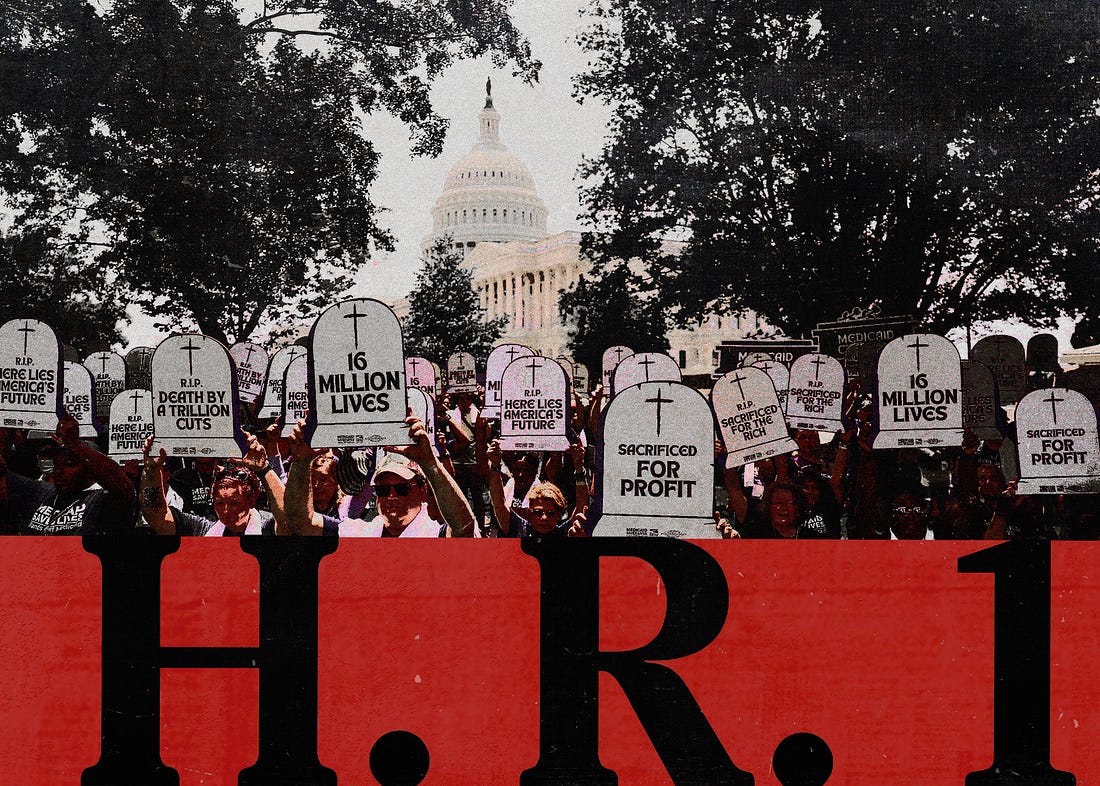|
 |
An Ignominious Bill Passed By an Inglorious Body
Tens of millions will lose health insurance, but at least all those struggling Americans in the top 1 percent will get a big tax break.
 |
Senate Votes to Comfort the Comfortable and Afflict the Afflicted
THE LEGISLATION SENATE REPUBLICANS passed on Tuesday is probably going to kill a lot of people.
It sounds stark when you put it that way, but death is a stark thing. It’s also what can be reasonably expected from the GOP legislation, especially the cuts to Medicaid and the Affordable Care Act projected to leave nearly 12 million Americans newly uninsured.
When people can’t pay for medical care they frequently don’t get it. And when people don’t get medical care, they’re more likely to die early from a preventable condition. That’s what you’ll find if you read the latest research, and what you’ll learn if you ask people working on the front lines of medical care.
And death doesn’t even capture the full impact of the bill, which thanks to Tuesday’s vote seems likely to become law.
That outcome is not yet a foregone conclusion, to be clear. The bill requires approval from the House, where a different version passed in May and where several Republicans have already said they object to the Senate’s iteration.
But while those Republicans have enough leverage to block approval, forcing some kind of negotiation between the houses, they are already under enormous pressure from party leaders—and, especially, from President Donald Trump, who has said he wants a bill on his desk by July 4.
That deadline is arbitrary, and for Trump the primary motivation may be his hopes of staging a signing ceremony amid Independence Day pomp. But so far it appears to have succeeded in moving the debate along at a speed that is downright astonishing—and alarming—for such consequential legislation.
House Republicans held a vote five days after unveiling statutory language, putting the proposal through only perfunctory committee markups. Senate leaders did that one better, dispensing with even the charade of normal procedure and bringing their bill to the floor, where they were literally adjusting language on paper just minutes before the final vote.
Politically, it was a savvy strategy for avoiding scrutiny. So was packaging the entirety of the Trump domestic agenda into one legislative package, making it difficult for opponents to focus—and rally supporters around—any one part.¹
As of a few days ago, nearly half of America hadn’t heard anything about the “Big Beautiful Bill,” according to Democratic polling from Priorities USA. And only 8 percent had heard it included Medicaid cuts.
Mission accomplished, you might say.
But in trying so hard to shield the bill’s true nature from the public, Republican leaders may have also succeeded in hiding parts from their own members, who might not appreciate just how much some features of the bill undercut supposedly cherished MAGA goals like lowering the cost of living and making U.S. industry more competitive.
And that’s to say nothing about the disproportionate effects some elements of the bill will have on their own constituents.
YOU CAN SEE IT CLEARLY in the provisions yanking away Biden-era subsidies for clean energy and electric vehicles, in many cases quickly. (The tax credit for consumers buying electric vehicles would end in September.) It’s a way to own the libs, now that Trump has turned clean energy into almost as much a bogeyman as trans athletes and woke professors.
But Biden’s subsidies unleashed a factory-building boom that the legislation will weaken and maybe kill, which is why the bluest of blue-collar unions—electrical workers, building trades, iron workers—spent the last few days blasting the bill as a historic “job killer.” And those jobs are likely to have an outsized effect on red states like Texas, now America’s capital for solar-panel manufacturing, because that’s where a disproportionate share of the subsidies went.
And that’s just the immediate effect. Giving up support for wind and solar means giving up on the easiest, cheapest way to increase generating capacity right now—something tech executives desperately tried to convey to Trump and his allies, with a warning that it will set back U.S. firms in their quest to develop artificial intelligence. That’s on top of ceding industries like battery storage and electric vehicles to competitors, especially the one Trump brings up the most: China.
Look down the road, and you’ll see an America that is more reliant on other countries for energy—and, most likely, paying a lot more than it would if it had spent the next few years keeping up in the global alternative-energy race. Americans can expect an extra $170 billion in annual energy bills between now and 2034, according to a projection by the firm Energy Innovation.
THE BILL’S FOOD-ASSISTANCE provisions work out to a roughly 20 percent reduction, in what would be the largest cut in the history of what’s now known as the Supplemental Nutrition Assistance Program (SNAP, still widely called “food stamps”). The biggest part of the cut involves a shift in costs to the states, which for the first time in the program’s six decades would have to cover a share of the costs. Some states would,